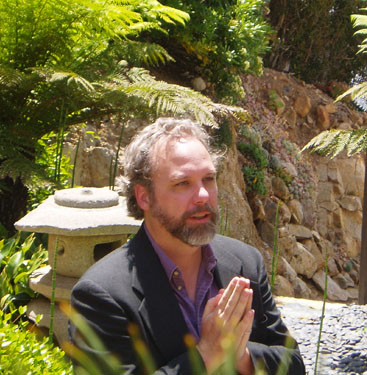There’s been growing media coverage of the widely anticipated 12/21/2012 date – which marks the end of the Mayan Long Count calendar, a rare Winter Solstice galactic alignment, and associated New Age predictions – with journalists and skeptics scoffing at doomsday predictions that it will trigger the apocalypse.
Yet as I’ve researched the prophecies, predictions, and possibilities associated with 2012, it seems that the only significant people offering up such end-of-days views are those seeking to mock them, shoot them down, or whip up hysteria. And nobody is feeling more frustration over this straw man media hype than author/researcher John Major Jenkins, who has written more about the significance of this date than anyone.
Before Jenkins would even let me interview him, he had me read the “Guide to 2012” that he prepared for those interested in writing about the subject, which he begins by reinforcing the accuracy of the 12/21/2012 date and clarifying its significance. “The doomsday assumption is not found in Maya tradition,” wrote Jenkins, who has researched the subject for 25 years and written nearly a dozen books on Mayan cosmology and beliefs. “The evidence indicates that Maya concept for cycle endings (such as 2012) is transformation and renewal.”
That idea – that we’re leaving an age focused on competition and consumption and entering an era of greater cooperation and connection – has been emphasized by everyone that I’ve interviewed on the concept. That includes New Age authors, a professor who studied Mayan folklore, political activists seeking a shift now to avoid real ecological and economic catastrophes later, and astrologers focused on the alignment of the earth, sun, and dark center of the Milky Way for the first time in 13,000 years (when that alignment occurred on the Summer Solstice, double that period for the last time it appeared this way on the longest night of the year, which some view as a more significant catalyst for change).
“I feel like the collective has been unable to receive the basic message I’ve been trying to give,” Jenkins told me, a hint of irritation in his voice as he recounted his painstaking research into Mayan artifacts and beliefs, the significance of which lies largely with their connection to the natural world that many modern people have lost. “That doesn’t seem to be what the collective wants or what the mainstream media want to say.”
Jenkins expresses almost equal frustration with those who seek to discredit or misrepresent his work as he does with those who have appropriated it for their own political or self-aggrandizing purposes. “We don’t know what’s going to happen,” he said. “We’ve been filtering 2012 through this kind of Nostradamus lens.”
Yet beyond his main point of simply understanding and honoring the Mayan people, Jenkins does hope that people use this moment as a prompt to create a transformation in global consciousness: “The challenge is for us to engage in and participate in the world in a more sustainable way and get past the domination mode.” And by “moment,” Jenkins and others emphasize that 12/21/2012 is the peak of moment lasting weeks, months, or years, depending on people’s perspectives.
Rob Brezsny, the San Rafael resident whose down-to-earth Free Will Astrology column has been printed in alt-weeklies throughout the country for decades, told us he respects Jenkins’ work and sympathizes with his current plight. “He gets it from both sides,” Brezsny said, noting how Jenkins gets attacked by both the skeptics and true believers.
Brenzsny is also a little skeptical about all the hype and focused hope surrounding 2012 – mostly because he thinks such magical thinking discounts the need for the long, hard work involved in either spiritual or political transformations – but he does believe in the importance of markers and rituals like those associated with the 12/21/2012 date.
“I think most people these days understand that how the world proceeds is through spectacles,” Brezsny told me. “The activists believe this may be a good moment, a good excuse to have a transformational ritual and to take advantage of this time. We need transformational rituals…Rituals have been a way to marshal our emotional and spiritual resources.”
Both Jenkins and Brezsny acknowledge the difficulty, even the danger, of relying too much on this moment to spark the sociopolitical renewal the world needs. “It’s a complex phenomenon as far as cultural change, and the recognition that things need to be done differently,” Jenkins said.
Yet Brezsny said that to achieve the kind of fundamental transformation that humans need to address issues like global warming and the mass extinctions now underway, that begins with a personal awakening and realization of our connection to one another and the planet. We need to set aside our egos and selfish desires, listen to one another, regain our connection to the natural world, and learn to work together. As Brezsny said, “For me, so much of what the revolution is about is how we treat each other moment to moment.”
These are just two of the dozens of sources that I’ve been interviewing about the 2012 predictions and possibilities, which I’ll take an in-depth look at from a variety of perspectives for the Guardian’s long Dec. 19 cover story (we’ll also include listings and other resources for how to spend that much-anticipated moment, such as the World Unity 2012 online hub).
Then I’ll be traveling through Mayan country in the Yucatan from Dec. 17-23, interviewing fellow pilgrims and wisdom keepers, visiting Tulum and other significant sites, and attending the Synthesis Festival in Chichen Itza, Mexico (and perhaps the Day Zero Festival in Playa del Carmen), so I hope you’ll follow along with my regular postings on this site. See you on the other side.

